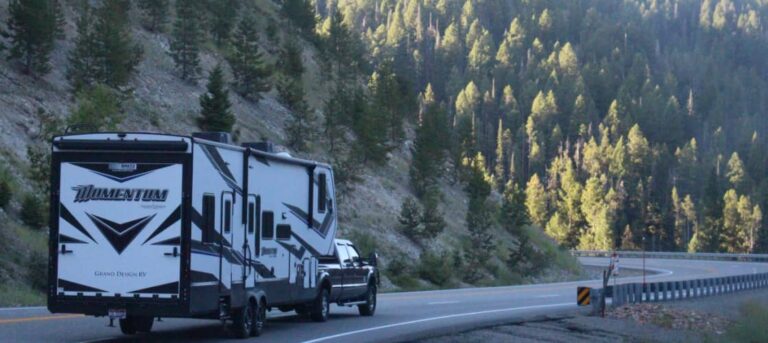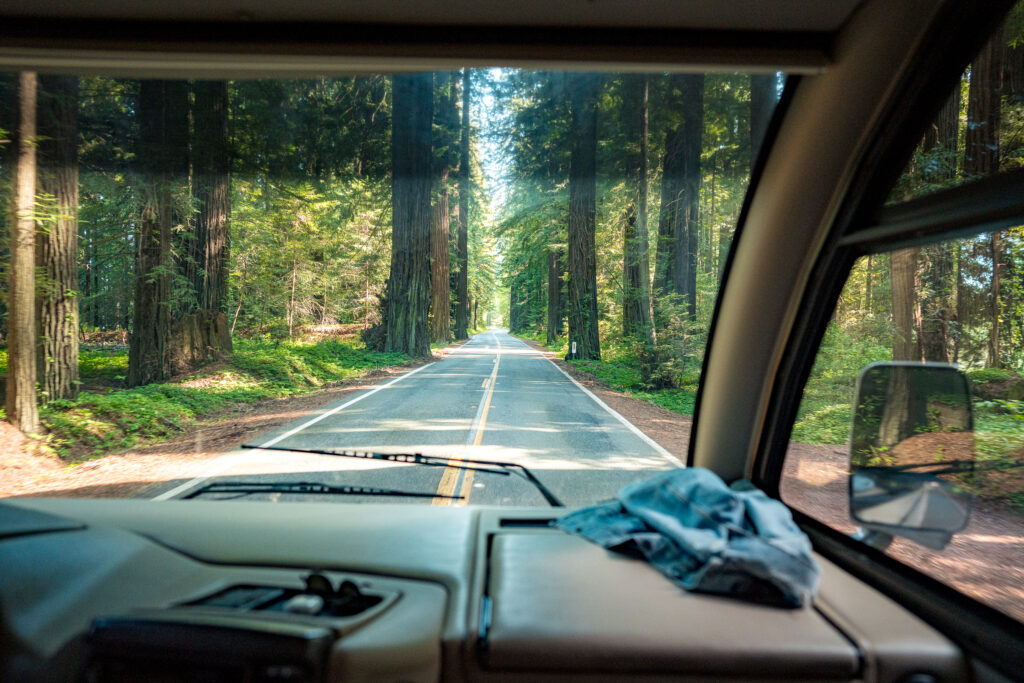
Keeping an RV full of gas or diesel might just be the most expensive part of owning and operating a motorhome. Even the smallest RVs require lots of gas to move a vehicle of that size and weight down the road.
This article will give you an idea of what you can expect for RV gas mileage. Different sizes of rigs will get different mileage, and you’ll get a general idea of mileage for each category. We’ll also answer the following questions:
- How much does it cost in gas to drive an RV?
- What is the standard MPG for each RV class and how much gas do they hold?
- What RV has the best gas mileage?
- RV MPG FAQs
- Is RVing a green way to travel?
- RV gas mileage calculator
How much does it cost in gas to drive an RV?
The cost of gas varies wildly depending on what part of the country, and in some cases, what part of the county you’re in. It also fluctuates with the market, dipping when the commodity is doing well and going higher when it’s harder to come by.
The answer to how much it costs in gas to drive an RV will depend on the type and size of rig you’re driving. It will also depend on how far you’re going, what kind of terrain you’re traveling, and your speed. To help you gauge approximately how much gas you’ll need, apply the following formula to your specific data:
- Find out how many miles you can travel on a full tank: Miles per gallon x gas tank size = how many miles you can drive
- Calculate the cost of filling up your gas tank: Gas tank size in gallons x cost of gas per gallon
- Calculate the miles to your destination and compare it to the miles you can drive on a full tank. You should then have an idea of how many tanks of gas it will take to get to your destination. Multiply that by the cost of filling up your gas tank to get an idea of what your trip will cost.
Lets take a look at a quick example:
You drive a Class C that gets 10 mpg and has a 40 gallon gas tank. So you can drive 400 miles on a full tank. This will cost you $160 dollars to fill up at $4 a gallon. You want to take a trip from Cleveland, Ohio to Orlando, Florida, driving about 1050 miles. The trip will require just over 2 and half gas tanks, and
would come to a total cost of $420 dollars one way.
When gas prices are high and the cost of driving looks high, remember you’re still saving on accomodations and possibly more expensive transportation costs like plane tickets.
Once you know the basic cost of going a certain distance, you can better calculate how far you can afford to go.
What is the standard MPG for each RV class and how much gas to they hold?
The different classes still have a lot of variation within each class, so it’s hard to get precise with MPG for each class. There are lots of variations in size and weight even within just one category.
You can always ask your RV dealer about the estimated mileage for a vehicle before you buy it.
Here are some guidelines to help narrow down what you can expect for MPG in each category of RV.
Class A RV gas mileage
These large, luxurious models are some of the heaviest on the road. Along with upscale appliances and premium furniture, Class As have structural and mechanical components, including slide-outs and a weighty power train.
A Class A motorhome might see about 6-8 miles per gallon on average and sometimes as little as 4 MPG when traveling in tougher conditions (like over steep, hilly terrain).
Class As tend to have the largest gas tanks in order to feed their voracious, constant appetites. These tanks range from about 70 to over 100 gallons, and some can hold as much as 150.
Class C RVs
Class C motorhomes attract families who want room and amenities, but want something smaller and more affordable than a Class A motorcoach. Along with the actual price of the vehicle being lower, Class As also get substantially better gas mileage … about 10-13 MPG.
Class C RVs come in a wide range of sizes, from 17-foot Minnie Winnie Winnebagos to lengthy 30+ foot rigs with multiple slide-outs. You can expect your rig to hold between 30 to 70 gallons of gas, although it will depend on the exact shape, style, and footprint of your Class C.
Travel Trailers
Travel trailer mileage is all over the map. It varies depending on the size of the trailer as well as the capacity and power of your tow vehicle. A small Casita travel trailer towed behind a Ford F150 might get around 12 miles to the gallon, whereas a larger fifth-wheel trailer is probably going to get a lower gas mileage, even behind a one-ton truck. Of course, some owners report getting as much as 15 or 16 mpg with their trailers, so it depends.
Travel trailers and towables, of course, don’t have fuel tanks of their own. These vehicles are dependent on the power of the truck or car that’s towing them. You’ll want to check the tank capacity of your tow vehicle, but most trucks hold between 15-30 gallons.
Class B Sleeper Vans and Small RVs
If you’re interested in traveling in a converted van, sleeper van, or micro camper, you’ll get some of the best gas mileage an RV can offer. These tiny RVs can get as much as 15 to 18 miles to the gallon.
You should probably expect about 25 gallons of capacity, but again, the exact figure will depend on your manufacturer and model.
What RV has the best gas mileage?
It’s not that cut and dried to do a simple RV mileage comparison. Although larger vehicles tend to use more fuel than smaller ones, factors such as your RV’s age and the kind of terrain you’re driving on play a serious part in how far you can go on a single tank. Circumstances like driving in the mountains add strain to your engine, which means your fuel efficiency will drop lower.
Older RVs also tend to get worse gas mileage than newer ones, just like regular street vehicles. That said, in general, if you’re looking for an RV with great gas mileage, smaller is better.

RV MPG FAQs
Here are some of the most commonly asked questions about RV MPG.
Is diesel more fuel-efficient than gasoline in an RV?
Diesel is a more efficient fuel source in all cases, including in your RV. That’s why many Class A motorhomes are powered by strong, rear diesel engines that push them along the road (thus the name “diesel pushers”).
According to The U.S. Dept. of Energy, “Diesel fuel contains roughly 10% to 15% more energy than gasoline. So, diesel vehicles can often go about 20% to 35% farther on a gallon of fuel than their gasoline counterparts.” Newer engines are more highly developed and often burn cleaner and more quietly than gas-powered models or older diesel engines.
But diesel does have its drawbacks. In some cases, it’s more expensive than gas. It can also be harder to find. Most people likely won’t give up an RV they love because it’s powered by gas as opposed to diesel, but it is important to understand the differences between these two fuel options.
Gross Vehicle Weight: How does it affect MPG?
Gross Vehicle Weight is the total maximum weight your RV can be while still remaining road-safe. And because heavier objects burn more fuel, an RV with a higher GVW rating stands to be less fuel efficient.
That said, just because an RV can weigh up to a certain amount doesn’t mean that you have to hit that maximum weight. Reducing the overall weight of your rig is one of the best ways to save money on RV gas mileage. You can do so by avoiding traveling with water in your tanks or a pantry stocked full of food. Just make a grocery store trip as soon as you get to the campground.
What are the best ways to save fuel in my RV?
There are a number of ways to save money on fueling your rig.
Begin by using an app like GasBuddy to find the cheapest gas available in your area. No matter how many miles per gallon your motorhome gets, it’s always worthwhile to find the cheapest source of fuel. When you’re talking about such a big fill, even a few cents per gallon adds up.
Also, carefully consider whether you want to purchase a gas or diesel RV. Diesel rigs tend to have better fuel efficiency, although the fuel itself might be more expensive and harder to find.
Finally, keep gas mileage in mind whenever you’re traveling in an RV. On every road trip, have a plan for where you’re going and know how far you’ll have to drive to get there. Run your prospective destinations through an RV gas mileage calculator in order to discover the cost to get there. Then, you’ll be able to pick destinations wisely and save money on fuel.
Is RVing a green way to travel?
Given this information, you might think that RVing is just about the least-green way to travel. But that’s not true.
Even though RVs aren’t the most gas-efficient method of travel, they’re still considered far greener than traditional trips using airplanes and hotels. After all, the carbon footprint of one plane flight is pretty big. Then you still have to factor in all of the expenses and production that go into accommodation and food costs for the trip.
Plus, the flexibility and convenience of taking all your stuff with you and setting your own itinerary is worth spending a little extra at the pump. Just make the effort to be as green as possible in other ways to offset your damages. Finding ways to save water on the road and make your trip a little greener can be both easy and fun.
RV Gas Mileage Calculator
The only way to truly understand how much it’s going to cost to keep your rig fueled up is to observe how much you’re spending on fuel once you’ve already begun a trip. You can make theoretical guesses by using your average mileage and fuel costs as demonstrated above. But in real life, speed, terrain, wind, and a host of other factors will affect the bottom line.
You can also check out these tips for RV fuel efficiency while you’re on the road.
Ultimately, don’t forget to slow down while you’re taking your grand adventure. Not only will you get better fuel efficiency, but you’ll get to savor the journey.
